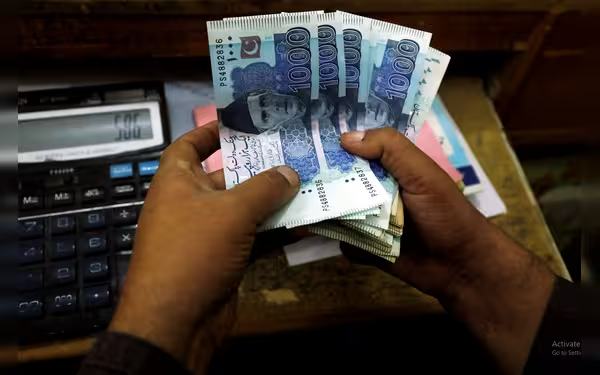Saturday, November 16, 2024 05:46 PM
Rupee Depreciation Due To $2.5 Billion Financing Shortfall
- Rupee drops to Rs277.86 against US dollar.
- Concerns over $2.5 billion financing shortfall rise.
- Imported goods may become more expensive for citizens.
 Image Credits: tribune.com.pk
Image Credits: tribune.com.pkThe Pakistani rupee depreciates amid concerns of a $2.5 billion financing shortfall, impacting inflation and import costs.
The Pakistani rupee has faced a significant challenge recently, as it depreciated by Rs0.12, bringing its value to Rs277.86 against the US dollar in the inter-bank market. This decline is primarily attributed to rising concerns regarding a potential $2.5 billion shortfall in foreign financing for the ongoing fiscal year. Such financial uncertainties can create ripples in the economy, affecting everything from import costs to inflation rates.
According to the Exchange Companies Association of Pakistan, the local currency also eased by Rs0.03 in the open market, closing at Rs278.77 per dollar. This situation highlights the ongoing volatility in the currency market, which can be influenced by various factors, including international economic conditions, domestic policies, and investor sentiment.
The implications of a depreciating rupee are far-reaching. For everyday citizens, it means that imported goods, including essential items like food and fuel, may become more expensive. This can lead to increased inflation, which affects the purchasing power of the average consumer. Businesses that rely on imported materials may also face higher costs, which could ultimately be passed on to consumers.
Moreover, the potential financing shortfall raises questions about the government's ability to manage its fiscal responsibilities effectively. It is crucial for policymakers to address these concerns promptly to restore confidence among investors and stabilize the currency. The government may need to explore various avenues for securing foreign investment or loans to bridge this gap.
The depreciation of the rupee amid a looming financing shortfall serves as a wake-up call for both the government and the public. It underscores the importance of sound economic management and the need for strategic planning to navigate these turbulent waters. As the situation unfolds, it will be essential for all stakeholders to remain vigilant and proactive in addressing the challenges ahead.













